Grimdark fantasy is great, but sometimes (especially when the summer sun is beaming) we want something that’s more… optimistic. Just a little, at least! We’ve gathered 13 of our favorite brighter fantasies below, but be sure to add your own picks in the comments!
The Goblin Emperor—Katherine Addison
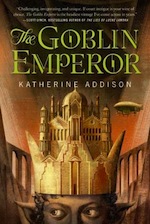
Katherine Addison’s delightful novel is about many things, but at its (lovable) heart it’s a story about realizing that sometimes your quirks are your greatest strengths. Maia, half-elven, half-goblin, becomes Emperor when his father and three elder brothers are assassinated. He has to learn how to rule a distrustful kingdom while he investigates the murder, navigates the byzantine politics of his (primarily Elven) court, and, hardest of all, stays true to himself. The story doesn’t shy away from the horrors of executions or the ugliness of prejudice, but it also focuses on the power of compassion to bridge social differences and effect change.
The Face in the Frost—John Bellairs
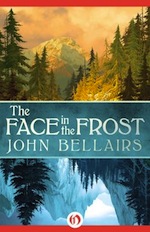
A wizard named Prospero (not that one) teams up with his old friend, the adventurer Roger Bacon (OK, maybe that one), to confront an evil power attacking their kingdom. They know going into the fight that they’re outmatched, but what else can they do? Bellairs’ story, like all of his work, juggles truly effective horror with quirky humor. The book gives weight to both elements, owning up to the terror that would come with a fight against evil, but also never wallowing in that terror to the point of overwhelming the humanity of the book.
The Copper Promise—Jen Williams
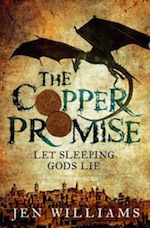
Williams’ novel combines some of the tropes of grimdark, e.g. mercenaries, torture, and tragic backstories, with some of the higher ideals of sword and sorcery. Best of all, it treats what could have been a slog through brutal battles as a lighthearted adventure. This bright tone, combined with a biting sense of humor, make the book fun as well as epic. The fallen knight is more complicated than we think, the swordswoman-for-hire is as handy with snark as she is with a sword, and… what’s this? The main character’s arc is one of rediscovering his humanity after a horrible trauma, rather than a slow degradation into despair? Is it possible?
Riftwar Series—Raymond E. Feist
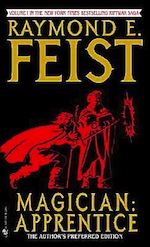
Several denizens of Twitter suggested Feist’s work as an antidote to grit! The central conceit of the Riftwar books are the rifts themselves—they can join worlds, but those who travel through them can seek communication and exploration, or war and conquest, and the series explores many permutations of these choices. Sure, it has has war right there in the name, but it also has characters who are willing to sacrifice themselves for the greater good, who take chances on trusting each other (and have that trust rewarded), rulers who choose mercy over murder, and candidates for the throne who abdicate so that better people can lead. We’re a long way from Westeros when we’re reading Feist.
Shannara Series—Terry Brooks
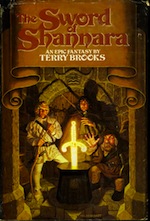
These are more high fantasy style, involving hero quests in addition to mundane acts of heroism. As he says in his 2003 book Sometimes the Magic Works, his “protagonists are cut from the same bolt of cloth as Bilbo and Frodo Baggins. It was Tolkien’s genius to reinvent the traditional epic fantasy by making the central character neither God nor hero, but a simple man in search of a way to do the right thing….I was impressed enough by how it had changed the face of epic fantasy that I never gave a second thought to not using it as the cornerstone of my own writing.”
Chrestomanci Series—Diana Wynne Jones
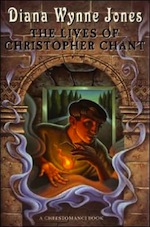
All of Diana Wynne Jones’ books could be on this list, but we’ll stick with the Chrestomanci Series, and particularly, The Lives of Christopher Chant. People die, parents split up, and villainous uncles trick nephews into nefarious schemes, but Wynne Jones still gives us characters to root for and dashes of hope. Christopher Chant himself is good-hearted (occasionally bitchy, but good-hearted), going out of his way to help a young goddess, and forging a friendship with the awesomely-named Throgmorten the Cat.
The Sun, the Moon, and the Stars—Steven Brust
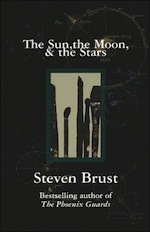 Brust’s novel is about a painter creating oil paintings and putting an art show together. It’s also a retelling of the Hungarian tale of Taltos, who uses expert-level trickster skills to con the sun, moon, and stars away from the monsters who own them. The stories parallel each other in fascinating ways, but much of the weight is given to the modern story of a person who is part of both an artistic community and a supportive relationship. This allows the book to work as an inspiring tale of the value of art, rather than just another quirky fairytale mashup.
Brust’s novel is about a painter creating oil paintings and putting an art show together. It’s also a retelling of the Hungarian tale of Taltos, who uses expert-level trickster skills to con the sun, moon, and stars away from the monsters who own them. The stories parallel each other in fascinating ways, but much of the weight is given to the modern story of a person who is part of both an artistic community and a supportive relationship. This allows the book to work as an inspiring tale of the value of art, rather than just another quirky fairytale mashup.
Range of Ghosts—Elizabeth Bear
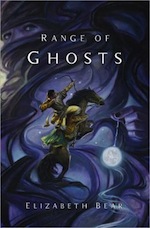 Range of Ghosts, the first book in Bear’s Eternal Sky trilogy, gives us an epic fantasy world influenced by Central Asian culture. Temur, a grandson of the Great Khagan, and Samarkar, the former princess of the Rasa dynasty who abdicated her royalty to become a wizard, must stand together against the hidden cult that has caused civil war throughout the empires of the Celadon Highway. While this is a complex book, with layers of religious tradition and political intrigue, Bear also focuses on the characters at the story’s center, and, as Liz Bourke said in her review, “the significance of a single life, united with other single lives,” and “moments of kindness and stillness amidst the horror of war,” creating an epic with a beating, human heart.
Range of Ghosts, the first book in Bear’s Eternal Sky trilogy, gives us an epic fantasy world influenced by Central Asian culture. Temur, a grandson of the Great Khagan, and Samarkar, the former princess of the Rasa dynasty who abdicated her royalty to become a wizard, must stand together against the hidden cult that has caused civil war throughout the empires of the Celadon Highway. While this is a complex book, with layers of religious tradition and political intrigue, Bear also focuses on the characters at the story’s center, and, as Liz Bourke said in her review, “the significance of a single life, united with other single lives,” and “moments of kindness and stillness amidst the horror of war,” creating an epic with a beating, human heart.
The Dragon’s Path—Daniel Abraham
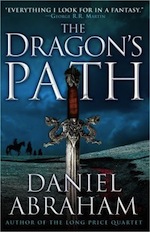
The Dragon’s Path is epic fantasy that picks up after the dragons have gone, leaving behind thirteen races who were bred to serve them. Now those races squabble and war with each other as they try to map an economy and political destiny. While there is a lot of page-time spent on pseudo-Renaissance banking systems, Abraham also takes the time to give us several point-of-view characters that enrich the story with humanity. He chooses to focus on a higher-class couple who would probably be the villains in most books, but here are made worthy of empathy.
Little, Big—John Crowley
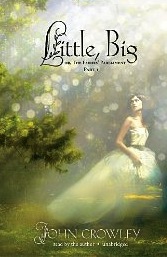
Little, Big unfolds over nearly a century, as the Drinkwater clan builds an intricate relationship with the world of faerie. We meet the human family, hear rumors of magical beings, visit a dystopian City, and spend some time with a Grandfather Trout who might be a cursed prince. Crowley isn’t afraid to slow down and ponder heady subjects like free will and fate, or to tell his story through intricate detail and gorgeous language, which led to a novel that Ursula le Guin said, “…all by itself calls for a redefinition of fantasy,” and Thomas Disch called “the best fantasy novel ever. Period.”
Lyonesse Trilogy—Jack Vance
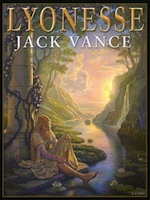
This trilogy melds Arthurian stories, chivalric tropes, and Celtic mythology into a story of a despotic king, his daughter, and her lover. Since Vance took elements from several different medieval periods and used those elements to bring life to his own magical lands, he can play around with references to stories and echoes of themes, such as the fall of Atlantis, without being tied to an expected narrative. While the story itself is not exactly lighthearted, it does feature plenty of humor, fun, and romance. He also uses the Atlantean references to tinge the whole story with melancholy—how long can Lyonesse last? Does the possibility of the Kingdom’s end overshadow the joy that can be had in the moment?
The Innkeeper’s Song—Peter S. Beagle
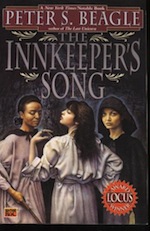
We talk about The Last Unicorn a lot on this site, because The Last Unicorn is fucking awesome. But! Peter S. Beagle did so much more! So when a Twitterer mentioned Beagle’s work, I decided to highlight The Innkeeper’s Song. Beagle jumps across multiple points of view to weave several different quests together. Tikat pursues his childhood love, whom he saw resurrected by magicians. Lal and Nyateneri, the magicians, are racing to save their old mentor from his powerful but evil student. Lukassa, the resurrected girl, has her own path to pursue. And the Innkeeper himself must take them all in, even though he knows they bring trouble with them. Through nested quests and elegant language, Beagle tries to get to the heart of death, love, and duty.
The Curse of Chalion Series—Lois McMaster Bujold
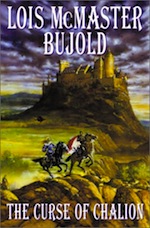
This series is a melding of fantasy and theology informed by elements of medieval Spanish history and mysticism, especially the reign of Ferdinand and Isabella in the late 15th Century. The Curse of Chalion follows Lupe dy Cazaril, who returns home after war and enslavement to try to live a quiet life, but instead finds himself working to lift the curse that lays on the royal family that has acted as his patron. A little bit epic, a little bit slice of (imaginary, alternate universe) life, the series takes questions of morality and duty seriously, without succumbing to endless bouts of violence or despair.
So, this is our list, but we’re sure there are more upbeat fantasies out there—give us your suggestions! Do you want some light to cut through the grimdarkness, or are do you prefer your fantasy as gritty as possible?
Originally published in April 2014.










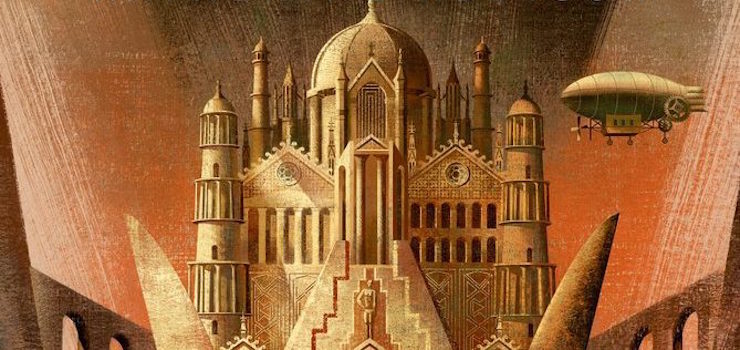
Thanks for this list! Goblin Emperor may be my favorite fantasy book of the last few years (I’m desperately hoping for a sequel or spin-off in the same world at some point), so I’m excited to check out some of these other titles.
Great article! Now we need the counterpart: optimistic science fiction!
Can we count Harry Potter? I’ve been rereading it and it is really helping me get through some of the terrible things we’ve been hearing about in the news. I prefer my fantasy to be not to gritty. It’s just a personal taste.
This may be too simplistic to count but…can I count Narnia? A few weeks ago when I realized I needed something light and warm and encouraging to read…picked up first book(LWW) from my shelf and dove in. Four books in and I’m very glad I did. Optimistic indeed – and full of joy and beauty!
The Rook and Stiletto by Daniel O’Malley. Humorous supernatural spy thrillers, a genre I love, and I’ve only found two authors who write it. Charles Stross’s Laundry Files are great, but definitely grimdark (although funny), but O’Malley’s Checquy Files are optimistic at heart.
I finally read “Curse of Chalion” last year, and oh!, how I loved it! It’s a beautiful story about interesting people, the Spanish-influenced setting is just different enough to feel fresh, and the religious system intrigued me.
“Goblin Emperor” was good fun, too. I look forward to the author showing us more of the growing technology in her world.
If you want lots of optimism, look at Bujold’s Penric novellas set in the Chalion verse or her Sharing Knife series.
BRIDGE OF BIRDS by Barry Hughart
@@@@@ 1
me, too. The Goblin Empereor is my number 1 comfort read.
little, Big is one of the best fantasies ever written, up there with Lord Dunsany and Le Guin’s Earthsea, Anne the Curse of Chalion is brilliant. I love all of Bujold’s work in the world of the Five Gods.
Thanks for this article.
I am not sure I would call Suldrun’s tale in Lyonesse “light hearted”
Martha Wells’s Raksura series, which begins with The Cloud Roads. The world is a fascinating panorama of races, cultures, cities and forest, and ruins of long-ago civilizations. The main characters are such fun. Wells described them in a Scalzi Big Idea post as “matriarchal bisexual polyamorous flying shapeshifting lizard-lion-bee people,” but I will add, so human in their desire for home, family, and connection.
I thought of The Curse of Chalion, but only to think you wouldn’t count it as optimistic; but the eucatastrophic ending makes up for all.
The arc of Terry Pratchett’s Discworld bends toward improvement over the course of all the books, and often within one.
Jo Walton’s My Real Children
Robert Asprin’s Myth Adventures (Skeeve/Aahz) is a ridiculously fun romp.
I really like Daniel Abraham’s work in general, and The Dagger and the Coin in particular, but I really wouldn’t have thought of them as optimistic, or an antidote to grimdark. Maybe I don’t read enough grimdark to get the contrast. Likewise My Real Children is a lot more bittersweet than hopeful.
I will enthusiastically endorse Bujold’s Five Gods books, and The Goblin Emperor.
I’d say that almost any of Neil Gaiman’s novels could go on this list, particularly Stardust for its fairy tale atmosphere, and Anansi Boys for its soul.
Lawrence Watt-Evans’ Ethshar series tends to feature reasonable, smart, decent people being reasonable and decent and smart.
Graydon Saunders’ self-published Commonweal books feature a rather hostile world, but people within it who respond to that with principles of egalitarian democracy. (His wizard students spend a lot of time doing civil engineering.) Titles are The March North, A Succession of Bad Days, and Safely You Deliver.
Zenna Henderson, particularly her stories of the People. The only in-print version is Ingathering, published by NESFA.
Any number of pieces by Tamora Pierce would definitely fall under this category though I’m especially fond of her Song of the Lioness Quartet Trickster’s choice Duology and Beka Cooper Trilogy. Most of her main characters are women, the adventures and trials they must endure are as thrilling as they are inventive and her ability to balance the darker pieces of the plot with humor is incredible. As a bonus, each series is connected across the same universe. 10 out of 10 reccommend everything she’s written.
If you want something lighthearted and fun, then you want the Enchanted Forest series, 4 books by Patricia Wrede. Dealing with Dragons, Searching for Dragons, Calling on Dragons and Talking to Dragons. These fantastical fantasy books gleefully turn trope after trope on its head — dragons in general, princesses captured by dragons, knights slaying the dragon and rescuing the princess, the whole fairy tale thing. The heroine of the piece, Cimorene, is a delightfully down-to-earth princess. By turns, wise, witty, funny, silly and exciting, Cimorene discovers the nefarious plot and guess who comes to the rescue!
Subscribed.
And @David_Goldfarb, I can here to mention the Commonweal books as well.
Neil Hancock, The Circle Of Light trilogy!
The Chrestomanci series makes me nostalgic, I read one of the books on vacation with my family, lost the book and didn’t rediscover the author until AltaVista became a thing. And then it turned out it was part of A SERIES!
@JFalk Agreed. I would love a list of uplifting scifi novels. I recently read the Poseidon’s Children trilogy by Alastair Reynolds and enjoyed the optimism and imagination of it. Any reciprocal recs?
Some of those entries are strange choices.
The Dagger and the Coin series is a bleak examination of human nature, with a villain POV who is convinced he is the hero and commits acts of mass death and slaughter to that end. It is not really a hopeful or optimistic series, at all.
The Riftwar saga is lightweight in writing style and characterisation, and the saga overall has something of a positive ending, but again it is very bleak and dark in how it gets there. Some of the books – Rage of a Demon King in particular – are GRRM-levels of grimdark, with war, death and rape (and attempted rape) appearing on the page. At the end of the series an entire planet is blown up, with hundreds of millions of deaths. This is not really optimistic in any sense.
Both Suldrun’s story in Lyonesse and most of the major arcs in the Eternal Sky trilogy are pretty dark and horrible, as bleak as anything in so-called Grimdark Fantasy.
I think the writer is confusing “it has a somewhat positive ending” with “it’s an optimistic story.” I’d count someone like David Eddings or Margaret Weis & Tracey Hickman writing solid, sunny fantasy adventures which are fun and have happy endings and not too much bleak carnage along the way, and are much more optimistic. Some of Pratchett’s work as well.
I’d also have to de-recommend the Shannara books, not because they’re not optimistic, but because they are not very good.
@22 I do sometimes wonder about the criteria people use on this site for recommendations. I once asked for a light hearted and fun-campy space opera with lots of FTL, and people recommended The Expanse. Which is the opposite of everything. Sometimes I think people just like to shoehorn in their favourite books and shows.
I mean take, @12 recommending Discworld. I mean I love Pratchett’s writing, but the vast majority of his books -fun and often in the first few books funny too- are bittersweet in their tone. And one, Monstrous Regiment, has an absolute downer ending with nobody having learned a damn thing and the cycle of abuse starting all over again.
It is hard to find optimism, because writers find (w)angst much more interesting to write (same as with acting, the wangst is much more interesting for actors and directors too; hence SW:TLJ) but I find it very boring and unpleasant to read.
As far as adding my own rec, I would give Terry Brook’s “Magic Kingdom For Sale” series a punt. If you can get over the rather dated premise of a rich guy being angsty about being rich, which thankfully only persists for the first quarter of the first book, then it is a bout someone finding purpose and joy in life and genuinely appreciating getting the chance to be in an actual and for real magic kingdom complete with fantastical creatures. I honestly wish it had been picked up for tv instead of Shanara (if only because it is easier to remember the spelling of).
Please make this type of post a regular on tor.com: lists of optimistic (anti-grimdark) fantasy and SF.
I know these are kind of old and hard to find but Man!, Silverlock and The Harp and the Blade by John Myers Myers are both terrifically great reads and fundamentally optimistic at heart. Old school but great reads
I love to see Little, Big in pretty much any list (personally I’d have it tied with Titus Groan for best fantasy novel ever, but in this as in so much else Tom Disch’s taste was pretty spot on.)
That said, there’s a strand running more or less all the way through it which is broad and dark. The Russell Eigenblick section, Sophie Drinkwater – and especially The Three Lilacs, an almost perfect horror short hiding in the middle of a novel.
It really is a terrific book.
Check out Alexandra Rushe’s A MEDDLE OF WIZARDS if you like fun fantasy. Raine Stewart is a young woman from small-town Alabama who is transported to Tandara, a land full of all manner of magic folks and creatures. Gertie, the extremely grumpy troll, is hilarious, and I’m in love with Tiny the sentimental giant. Throw in a ghost, a warrior, a snarky (but good) wizard, a dark wizard and an insane god …it’s a recipe for pure fun. I’m waiting totally impatiently for the sequel, A MUDDLE OF MAGIC, which is due out in October. And check out her website (www.alexandrarushe.com) to see the map of Tandara. Totally cool.
Poul Anderson’s Three Heart and Three Lions needs no introduction.
Here’s a tale of knighthood’s flower
And of one man’s finest hour:
The story of a most strange land,
Of Holger Carlsen’s little band,
Of fights with trolls and giants, and
The winning of a swan-may’s hand.
By one of Denmark’s noblest scions.
(Chorus) Three Red Hearts and Three Gold Lions!
Randall Garrett’s Lord Darcy stories. The complete series, edited by Eric Flint, is available used. Beware puns! But that’s true of all of Randall’s work. He is guilty of the versification of TH&TL above.
Sharon Lee’s Archers Beach trilogy, starting with Carousel Tides. Each book has its villain, some very dark. But it’s hard to grimdark a series built around a magical merry go round.
Believe it or not, David Drake has a deft touch at lighthearted fantasy. You can read The Enchanted Bunny and A Land of Romance here: https://www.freesfonline.de/authors/David_Drake.html
The series that begins with Sorcery and Cecelia or The Enchanted Chocolate Pot, by Patricia Wrede and Caroline Stevermer. A glance at the title suggests someone is having fun. This is from The Grand Tour, in the same sequence.
As the fish course began, I heard a soft creak overhead. I glanced up in time to see a piece of the plaster ceiling the size of a wagon wheel bid farewell to its grip on the laths above and crash down on the table. Soup tureen, candelabra, glasses, and plates alike were cast into chaos.
“Dear me,” said Mr. Brummel.
With all the aplomb I’d learned telling fibs as a girl, I turned to our guest. “Mr. Brummel, with such fine weather, we thought it might amuse you to take the rest of the meal in the classical fashion, al fresco in the garden. I hope you will accompany me?”
I only wish that everyone I ever told a bouncer to could be as willing to be deceived as Mr. Brummel. He was courtesy itself as he offered me his arm. “Then by all means, Lady Schofield, let us enjoy a fête champêtre. I believe there is to be a particularly fine moon tonight.”
Every time I try to read the Copper Promise I’m turned off by the horrible, unchangeable font it has in the kindle cloud reader.
The problem with these kind of columns is how subjective they are. Definitions tend to be inherently woolly. The article author seems to suggest GrimDark is a separate genre to Sword and Sorcery, when I’d argue it should be a prefix i.e. GrimDark S&S, or GrimDark SF.
IMHO, every story has to contain some darkness, otherwise there’s no drama. Without suffering, without battles, or at least someone dying, there’s nothing to drive the narrative forward. How dark you find a setting is a combination of how much darkness is there, how prominently the author features it, and your subjective feeling.
Therefore your “antidote” to GrimDark is entirely subjective. Take the term itself: it was coined as a set of four groups, defined by two sliding scales. Are the characters tending to do nice things, no matter what the personal cost (Noble) or are they likely to do nasty things, albeit for the most noble of reasons (Grim)? Are they living in a setting where those choices tend to turn out for the best, and everything trends to getting better for almost everyone (Bright), or do their decisions tends to make things worse, or the best they can hope for is to stem the inevitable decline of whatever they are trying to protect (Dark)?
So if GrimDark is the poison, what’s your antidote? Is it GrimBright, NobleDark or NobleBright?
And of course, because it’s all subjective, we can argue until the cows come home about how we catagorise different stories.
So, for NobleDark my first choice is a bit controversial: Lord of the Rings. Undoubtedly all the protagonist’s and their companions have noble intentions. However, the world itself is changing. The time of myths has passed, and magic is fading. All the monuments are of a bygone age, never to be equalled. The narrative (for me) isn’t about saving the world (and thereby maintaining the status quo), but about how the bad guy has set things in motion that will lead to a new (lesser) Age, and who gets to decide the details. This makes the setting really Dark for me.
Next is David Gemmell books. His settings are unquestionably Dark. For instance, in his Drenai sequence, the invasion the protagonist’s of his early books prevented an invasion. Or rather, we find it was only for a generation or two, and later books in the series are about heroes inspired by the now-legendary protagonists of the early books. These are flawed people, but (for me) the books are about why flawed people still do the right thing. One character is described by another as living his life as if the moral choices are black and white. He knows few choices are like that, that most are shades of grey, and doesn’t fault people for being realists, but chooses to act like they are all just that simple, even though he knows how difficult that makes life for him.
If you want a taste, try his standalone, Echoes of the Great Song. A dying, decadent civilisation has enslaved another sentient race under the delusion it’s “guiding” them, modelling themselves as gods. A multi-dimensional empire arrives offering immortality as part of their empire. All they have to do is feed the race they’re “protecting” into the infernal magics that support this empire, an empire run by an omniscient ruler. It seems they have no choice, but my labelling it NobleDark suggests differently… :)
But if you’re looking for stuff that’s optimistic, you’re really looking at stuff that on the Bright side of the scale.
So two recommendations for GrimBright:
first is Feist’s RiftWar series. Yes, the setting gets gradually better as the series progresses: peace treaties are signed, alliances strengthened, slavery ended, and evil is not only held at bay but pushed back. However, they get there by the protagonists’ not doing very nice things or acting solely out of self-interest.
For instance, in the first book one of the “heroes” is confronted by something (gladiatorial combat between slaves) that he considers unhealthy for the Empire he’s been conditioned to be loyal to. His response is to go fully magically thermo-nuclear on the arena (with packed audience) and a good chunk of the surrounding capital city – and shows scant remorse for the collateral damage.
Yes, there is another character who is much like Aragorn – all he wants to do is be a ranger, but his blood is that of kings, and his kingdom needs it’s king. Like Aragorn, he knows what a burden the Crown would be. Unlike Aragorn, there’s someone he can pass it to. Whether he does so because his half-brother is better suited to the role, or whether it’s to avoid it, is debatable.
Then there’s an episode of “high justice” later in the third book – on a covert mission, they capture a suspected bandit, torture him for information, and then kill him. One of the more idealistic characters is horrified, and is told “he was probably guilty of something that would have got him the gallows”. So that’s all right then.
Despite that, the early books are still optimistic. However, I found as the series progresses, the writing gets better, the characters more original and more complex (they tended to be fantasy archtypes to begin with) but along with that the protagonists’ become increasingly morally grey. As it moves through generations, major characters are killed off (some admittedly by old age, others off-screen to give new characters motivation). YMMV, but I found, through the characters, the books became much more cynical and unpleasant, despite overall improvement in the well-being of the average person.
Take Rise of a Merchant Prince. It’s an epic piece of world-building. One of the nobles actually lampshades this at the end of the novel, where he points out the (mostly clandestine) help they’ve given is because the trade routes opened and/or strengthened by “private industry” are exactly the supply lines they need for the next war, and they need ridiculously rich citizens to tap for “voluntary loans” to pay for the (as yet unfought) war. Yet the protagonist is a piece of work. Recruited in a previous novel literally from the gallows as part of a fantasy Dirty Dozen and sent on a suicide mission, he survived and earned his freedom. You’d hope for a redemption arc. Instead we get Gordon Gecko. As an example, he recruits his ne’erdowell cousin and together they get up to some shady and occasionally borderline treasonous shenanigans. Then they have a falling out, and an enemy agent (which the protagonist has been having extramarital relations with) tempts the cousin into one risk too many, and both the cousin and the enemy agent die. All the protagonist’s crimes (including the suspected treason) are attributed to the cousin, and the protagonist is in the clear. No remorse. No “by the grace of the Gods I dodged a crossbow bolt there”. Barely even a thought is given to his poor cousin who was only in that situation because the protagonist dragged him into it. Instead he’s sitting contentedly on his piles of gold, suddenly happy with his wife (who he only married for her money). It did not leave me with happy thoughts.
How about considering “The Queen’s Thief” series. I really enjoyed although I’m not sure if it’s YA or not. Either way it was a great read.
The Thief (The Queen’s Thief, #1) https://www.goodreads.com/book/show/448873.The_Thief
@31/ WillMayBeWise,
NobleDark > NobleBittersweet ?
Paul: Mu zein! This is no good!
Leto: Koolish zein. This is all the good we may ever have.
Also:
Gimli. “It is ever so with the things that Men begin: there is a frost in Spring, or a blight in summer, and they fail of their promise.”
“Yet seldom do they fail of their seed,” said Legolas. “And that will lie in the dust and rot to spring up again in times and places unlooked-for. The deeds of Men will outlast us, Gimli.”
“And yet come to naught in the end but might-have-beens, I guess,” said the Dwarf.
“To that the Elves know not the answer,” said Legolas.
@33 that’s Movie Aragorn you’re talking about. All Book Aragorn wants to be is king.
You’ve got to have bittersweet for it not to be grimdark=all bitter, or else just too sweet; the very thing grimdark is supposed to be the antidote to. Sure, you have murdered John Dearheart in Going Postal, and the failed Twenty Fifth of May in Night Watch, but the series moves in an upbeat direction both for the surviving characters–going from fugitive con artist to productive citizen, and lonely drunk officer in a despised service to sober, decorated, and a married father–and the society they are a part of, which goes from a fantasy cliché of lawless taverns and corrupt guilds, to an ever more interconnected, prosperous and safe civilisation. From no police to professional police, from no post to regular post, and so on.
Going Postal continues Pratchett’s long history of conversing with the rest of science fiction and fantasy by being clearly inspired by David Brin’s The Postman, itself a science fiction antidote to grimdark, in that a post-apocalypse hobo is where it starts, and it ends with the United States beginning to come together again.
Grimdark is where most everyone behaves badly, and it doesn’t matter even for the ones who don’t, because it all ends badly anyway. If some people behave with honour and that makes a difference, and things are at least as good at the end than they were at the beginning, that will satisfy to chase away the grimdark blues, I think. It’s why people are nominating The Curse of Chalion, which gets plenty dark at times.
A four year old recycled column with nary a new title in sight, even in the comments. Is it any wonder people can’t lift themselves out of depression if they can’t find entertainment that isn’t depressing and relentlessly grim? And heck, a third of the recommended books are downers.
So who is (still) writing lighthearted or positive fantasy? Turns out, lots of people. Here are authors with ongoing series, or who tend to write optimistic fantasies:
Tanya Huff. She doesn’t write series or standalones that don’t end well, and chances are they have a fair amount a humor with its share of drama.
Illona Andrews. A husband and wife writing team whose books often get categorized as romance, but they’re all fantasy as well, and good fantasy at that.
Wen Spencer. Her books, sf or fantasy, are about people trying to do the right thing in the face of evil and succeeding to some degree. Her Tinker series, her Eight Million Gods, and all else she writes reflects that.
The Ghost Bride by Yangsze Choo. I’ve not read other books by her but this is an optimistic story. It starts low but the heroine finds her freedom gives her some power and she makes use of it to gain what she wants in the end.
Sharon Shinn. Her books are all optimistic too, including all her newest. I like her Elemental Blessings novels.
Sharon Lee. She writes optimistic sf with Steve Miller, but her Carousel fantasy series set in New England is just as good.
Julie Czernada. Again, another who writes some great sf, but fantasy too. Her Night’s Edge books are wonderful (and not at all what they seem), and she’s still writing them.
Jim Hines. His stepsister scheme books (completely fractured fairy tales) are pretty darned funny.
Rachel Hartman. Her Seraphina books reminded me of the Goblin Emperor.
Ellie O’Neill. Reluctantly Charmed is a funny and charming book.
Zen Cho. Sorcerer to the Crown
Pat Wrede and Caroline Stevermer. Okay not new, but you can’t mention optimistic fantasy without including Sorcery and Cecelia.
Julie McElwane. Do time travel murder mysteries count? Then this ongoing series is good.
Goldilocks removed three books from the Bears bookshelf. Looking at the first, she thought “Ugh! Too grimdark!” Looking at the second, she thought “Ugh! Too syrupy sweet!” Looking at the third, she thought “Ah! Now this one is just right!”, and settled down for a pleasant read.
Then the 3 bears came home and found her reading on their couch, and they tore her to pieces.
@37
Grimdark isn’t an antidote to anything. It is a poison that is killing modern writing.
As I think about it, almost everything by Guy Gavriel Kay.
There’s S. Morgenstern’s The Princess Bride, the good parts version, if you don’t look too hard at William Goldman’s frame. Fencing. Fighting. Torture. Poison. True love. Hate. Revenge. Giants. Hunters. Bad men. Good men. Beautifulest ladies. Snakes. Spiders. Beasts of all natures and descriptions. Pain. Death. Brave men. Coward men. Strongest men. Chases. Escapes. Lies. Truths. Passion. Miracles.
@40,
King Lear? Hamlet? Macbeth? 1984?
Perhaps Grimdark itself is not the problem. The problem is a lack of attempts at NobleBright.
Ben Aaronovich’s Rivers of London series is just great. It’s a shame I haven’t seen much discussion of it on this site.
As far as debating the meaning of “antidote to grimdark” goes, if that’s meaningless to you or you don’t see the point, that’s fine, there’s plenty of other reading on this site.
Also, just because a book ends on an optimistic note, it doesn’t mean there’s no conflict (no conflict at all is just “fluff”). Personally, I find The Martian an incredibly optimistic book, because it is entirely about successful problem-solving.
For someone like me, who is incredibly averse to buying unknown authors so I don’t have to go though a misery-slog like Hobbs or Martin, a list like this is handy to find new stuff to read.
I am a big fan of Jack Vance but, as others have mentioned, Lyonesse really should not be on this list. There is one section (the bit with the ogre and the children it has captured) that is so unrelentingly grim and horrible that I have never been able to bring myself to re-read the book.
Abraham’s Dagger and the Coin is very much NOT an antidote to grimdark. I’ve actually not finished the series because it got so depressing that I couldn’t pick up that last book. Just couldn’t do it. I had to force myself to read the penultimate one at that. Good characters, good story but do not read it when in a blue mood.
Pretty much anything by Brandon Sanderson is full of light, hope and optimism… eventually.
But Warbreaker and Elantris epitomize this.
@35/Keleborn – that’s pretty much it, yeah. :)
Okay, so got side-tracked. I’ll get back to my recommendations in the next post. Before that just want to point out that people mileage really does vary, and we each have our vulnerabilities in different places, the point at which we draw the line.
For instance, Paul Cornell’s Fallen London urban fantasy is firmly (IMHO) placed in the NobleBright category. It’s well written and has original, engaging characters. All of which are trying to do the Right Thing. It’s clear their actions make a difference, and things are getting better thanks to them. *However*, I really wouldn’t recommend it as an antidote to GrimDark because the setting starts off really bleak, and the first book deals with child sacrifice. It’s not a happy book. It’s a police procedural, so we only see the aftermath, not the crime itself, but even so my wife couldn’t finish it.
In each of my recommendations, I try to flag anything which might hit people’s vulnerable spots.
GrimBright second recommendation: Terry Pratchett’s Discworld series. The setting goes through an accelerated industrial revolution as the series progresses, with improved living standards for almost everyone. Peace Treaties are signed. Trade agreements reached. Everyone recognises their interdependence and how it’s in everyone’s interests to get along a little better. Prejudices are put aside and people recognise what they’ve got in common is greater than their differences, even down to whether you’re a carbon-based lifeform, silicon-based, or even mystically-animated clay.
Like the RiftWar series, there are optimistic characters. Death. Mort. Cut-Me-Own-Throat Dibbler (Note: Don’t eat his pies – especially if they are on special offer). Margret.
Also like the RiftWar series, there’s also cynical characters, and they have centre stage. Vetinari. Rincewind. Vimes. Granny Weatherwax. Moist Van Lipwig.
Then there’s Carrot. He’s left deliberately ambiguous. He’s not stupid, but he appears very simple. Straight as an arrow. He could be just as he appears, with sword that’s a family heirloom, a funny birthmark that, if you squint, looks like a crown, and bags of charisma that carries everyone along with him when he does something monumentally naive. Or… he could be a master-manipulator with unknown ambitions. He’s never a POV character, so we never know, and he never confides in anyone if he’s the latter. He could just well be the reason the setting is Bright, because everything getting better coincided with him being introduced…
Unlike the RiftWar series, the optimistic characters don’t get killed off, and the cynical characters are surprised and delighted about how things turn out.
But… (and here’s why I put it in the Grim category), the cynical characters are the default POV. The first books follow Rincewind as he runs away from trouble. These are less about the plot and more about stringing a load of observational humour and jokes together.
As the series progresses, just like the RiftWar series, the writing gets better, and new characters are introduced. Unlike the RiftWar series, the Discworld kept my attention, and it does this by the passion showing through. Terry Pratchett was an erudite and witty man, but (as his friend Neil Gaiman has said) the thing you need to remember about him was that he hid a very angry soul, and this shows through in the later books. The men in power are either attempting to maintain a kind of dynamic status quo (the Patrician) or only stirred to action if their next meal is put at risk of being late (the Faculty of the Unseen University). Vimes is a font of fury at the those that prey upon those less fortunate than them, and has to exercise iron self-control that manifests as a rigid adherence to the law. Weatherwax is full of wroth at how stupid and short-sighted humanity is, and how everything would be so much better if everyone would just do as she says. She constantly compares herself to her predecessor, Black Aliss. Black Aliss is the horrible warning of what happens when you lose sight of what’s important, and so Weatherwax keeps reminding herself of that.
So that’s what might be off-putting to readers. It disguises the cynicism with humour, and the cynical characters are constantly surprised by how well things go, but the books have a … realists veiw of humanity. Take Montrous Regiment, the book that 23/random22 describes as ending with the cycle of abuse unbroken. I’m guessing this is to do with how the book ends (as it starts) with idealistic youth being given a rosy recruitment pitch (glossing over or ignoring the bad stuff) for the army. But… <SPOILERS FOLLOW>
a peace treaty has been signed, so violent death is not imminent. The army has been fundamentally changed, so those that are willing to serve who don’t meet the old, narrow criteria for soldier (which is not explicitly stated but is suggested as male heterosexual human) are no longer turned away or forced to volunteer through subterfuge. Then there’s the “War? What is it good for? Huh?!” passage about halfway through that tells us that yes, War is bad, but sometimes the alternative is worse, and to avoid that you need an army. Sometimes having an army is enough to avoid a war, because it makes waging peace the cheaper alternative for your neighbours.
It’s just at the end of the book, the recruits can be honest about who they are, and so the soldiers don’t have to worry about whether their comrades are hiding any secrets. So, you know, small victories. The big victories (like an end to war) may come, and the narrative suggests it just might. Just not today, so take the small victory.
That’s essentially what happens in the books. Each book has a small victory that changes things for the better, but doesn’t really let you forget it’s despite people’s flaws.
@50 Re Monstrous Regiment. The peace treaty has been explicitly broken, the armies are again on the march, and the reason for the war is the same old thing the royal succession. Polly is marching people off to their deaths because she personally dislikes the new claimant to the Royal Duchy, and not for the cause of democracy or anything. She is perpetuating the same cycle of stupidity and abuse and nothing has really changed in that regard. Nobody has learned the army is a poison, and nobody has learned not to fight, nor that if they simply must then it has to be for a better form of government. It is a pointless forever war.
@51/random22 – I went back and reread the last few chapters of Monstrous Regiment last night to ensure I wasn’t misunderstanding anything. The ending is left (I think deliberately) ambiguous, so your interpretation is valid, but so’s mine. <SPOILERS> for the ending.
1) The peace treaty has been explicitly broken.
The Prince is talking up his claim to the Royal Duchy. This could have been part of the peace treaty, but Polly’s assertion that it hadn’t been settled yet suggests to me the matter was left diplomatically vague in the treaty, if was included as all. So it could be broken, or not.
2) the armies are again on the march,
Well, one army is mustering, the foreign army we have no information on. Given the de facto ruler of Polly’s country is “acting like an old woman”, that suggests patriarchal language that means “avoiding appearing aggressive”.
3) the war
There is no mention of any fighting. If there has, it may not have devolved into all-out war. When Polly leaves the tavern for the second time, all the notices have been is a lot of patriotic hot air. While it could be war, it could also merely be “inflammatory language leads to an escalation of tension in the area, and countries have begun to move onto a war footing”.
4) Polly is marching people off to their deaths
Death is a possibility, but not a guarantee. If there is fighting, the idea is to avoid dying for your country, and making the enemy die for theirs, if they don’t run away.
5) because she personally dislikes the new claimant to the Royal Duchy,
Well, yes. Correct, apart from Prince Heinrich being an existing claimant. It’s part of why they fought the war Polly won her Sargent’s stripes in. She dislikes him for also being condescending and patriarchal.
6) and not for the cause of democracy or anything.
A personal dislike for an enemy is not mutually exclusive with more moral ambitions. Prince Heinrich is the head of a foreign country who has announced his intentions to annex Polly’s country. Since the military coup that replaced her country’s government, it’s in a transition. We aren’t given any information on what form that government is evolving into, but we do know attitudes are changing and being less patriarchal. Those changes are likely to rolled back by Prince Heinrich if he takes over. Polly also knows Vimes assessment of Heinrich, in that once he’s taken over Polly’s country, his territorial ambitions won’t be sated and Polly’s countrymen will likely be conscripted to fight in Prince Heinrich’s wars of aggression.
7) She is perpetuating the same cycle of stupidity and abuse and nothing has really changed in that regard.
She’s perpetuating a cycle, certainly, but I see it as one of mentor-ship. And instead of it being in secret, the advice being given in the darkness of a privy, it’s in the open and the light of day. And the new recruits are being given a choice: they can chose to live as men, or join as women. Each has its own challenges, but they have the choice.
8) Nobody has learned the army is a poison,
I see what you are saying here. The culture of the army perpetuates a toxic masculinity that poisons the society the soldiers return to. The females who chose to live as men adhere so closely to this venomous ideal that they end up actively encouraging it. Here’s where my interpretation differs. Polly knows this, which is why she returns to service as a female Sargent. Armed with Jackrum’s address book, it seems to me her intentions are to change the system from within.
9) nobody has learned not to fight,
Polly has William De Worde’s card, and she has the Clack’s. Armed with Jackrum’s address book and her rank as an active Sargent, she has access she wouldn’t have as a bar maid. And she has Vimes’ suggestion that people who sit around thinking about the future think it’s worth being friends with a country like theirs. So it seems to me she’s ready to fight with sword and crossbow, but intends to fight with words instead.
10) if they simply must then it has to be for a better form of government.
Again, it seems to me they are. The army isn’t mustering to invade, it’s gathering to repel an invasion and planned annexation from a foreign government. I’ll highlight again we don’t know anything about the current government of Polly’s Royal Duchy. From Prince Heinrich’s declaration, we can infer nobody has been chosen to take office, becoming the new Duke/Duchess. Prince Heinrich, in claiming the title, obviously wants to perpetuate that system. We don’t know what form of government Polly is serving. I assume a military junta, which could become a democracy. Or a dictatorship. We don’t know, but I’d hope for the former.
11)It is a pointless forever war.
That’s pretty much what the book is about. To borrow from “PratchettJob” on WordPress: “Monstrous Regiment plays with the reader a lot, hitting them over the head with a dogmatic feminist tract before subverting expectations completely and forcing them to think about the role of nation states and our responsibilities to others, within and without our borders.” The cycle continues unless someone changes it. It seems to me the book is Polly’s journey to become someone who is both capable and sees the need to enact that change. It’s not going to be quick, or easy. She’s building on Jackrum’s legacy, and she’ll likely have to pass the task onto the next generation.
Fully a tenth of Wellington’s officers at Waterloo started as regular soldiers. I suspect if she survives she’ll end up a general, but it seems to me that the last scene is ensuring if she doesn’t, there’s others there to continue to enact that change.
So yeah, it could be as bleak as you make it out to be, but it doesn’t have to be. The ambiguity just means it’s a matter of interpretation.
At last we get to NobleBright. Where things are great, until they go wrong, but don’t worry, there’s always some hero or heroine ready to step up and save the day. Even if they refuse The Call once or twice.
At the risk of upsetting @38/Kate, here are a few suggestions, although they may all seem a bit old school.
Don’t worry, Keleborn, I’ll try to avoid them being to saccharine-sweet. :)
The Thraxas series by Martin Scott.
An occult private detective in a fantasy city, it’s hard-boiled noir with magic in a medieval setting and played for laughs. It’s forgettable fluff, but Thraxas always gets involved despite his highly-tuned trouble-sense earning him off the case. Be warned, everything is turned up to eleven. (Example: his side-kick is a half-orc/half-Elven former gladiator working as a barmaid to put herself through college to become a lawyer). The whimsy meter reading is high on this series, so don’t examine things too closely.
The Belgariad pentology & the sequel The Malloreon Pentology by David (& Leah) Eddings
The authors (originally David was just credited, but it was an open secret that Leah was Co-author) note, without naming names, they wrote this to work out some philosophical questions about world-building. Clearly (at least to me), part of that was to explain why, in Lord of the Rings, countries living right next to each other have such distinct cultures and troop types. Their answer is twofold: first, each country gets its own god, so They created each culture according to Thier taste, and second, just after they did this, then Something happened, so the world is caught in a kind of loop, never really evolving until a Question is finally Answered.
Prophesy and magic are in play, and so the world-building does a good job of explaining why the story results in the a well-worn trope of the adventuring party being composed of stereotypes of each country- so you have a pseudo-Viking rubbing shoulders with a pseudo-Teutonic Knight, pseudo-Mongol Horseman, pseudo-Ancient Egyptian, psuedo-Roman Legionnaire and a pseudo-Italian Renaissance Merchant Prince/spy. The writing is good though, and the plot moves nicely along so you don’t question the absurdity, and the witty banter makes the characters three-dimensional.
At times the broad brush strokes adhere a little to closely to Lord of the Rings, but the detail is different enough to not notice until later. There’s plenty of darkness here, though. A cornerstone of the evil god’s religion is human sacrifice. A couple of recurring characters depict how bad medieval peasants had it. Oracles’ minds are broken by being vessels of prophetic verse. They are not treated kindly. To lampshade how divorced from humanity the mentor figure is, he finds a prophesy passage written by the evil priesthood on human skin. The protagonist is horrified, but the mentor is simply vexed at this display of style over practicality, as “human skin doesn’t hold ink well”, resulting in the scroll being virtually unreadable. The second pentology deals with the lengths a childless couple will go to in order to conceive – and then deals (once they’ve succeeded) with child abduction. The rest of the pentology is the search for their son complicated by prophesy. Not a trigger for everyone, but I know some people might find that upsetting.
Sharon Shinn has often been my ‘comfort’ reading – there are certainly tragic/dark things that happen, but you can usually be confident that things will ultimately work out in the end (and there’s usually a bit of romance as well).
WillMayBeWise – I like your quadrant :) And it’s funny you mention LotTR because I wasn’t sure if I wanted to mention it or not. For all people like to act like it’s the polar opposite of GRRM, it has a very strong bittersweet element to it, even at the end. Many of the characters do perhaps have more noble aims (although there are several who don’t) but it’s not really a happy ending. And the Silmarillion is even more tragic and filled with flawed characters. All that said, there is a very strong thread of hope that helps tide me over/inspire me.
If you want feel-good fantasy, you can look farther and find worse than Kipling’s Puck of Pook’s Hill.
I’d also recommend Mercedes Lackey’s Five Hundred Kingdoms series. It starts with The Fairy Godmother.